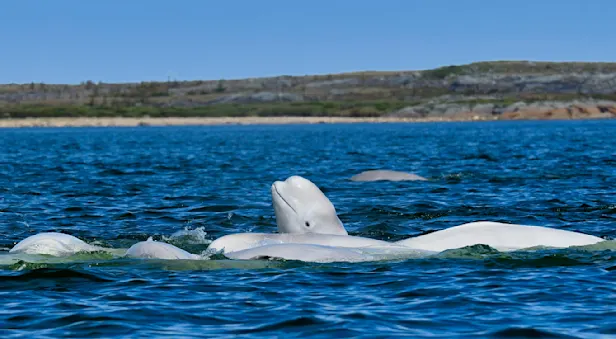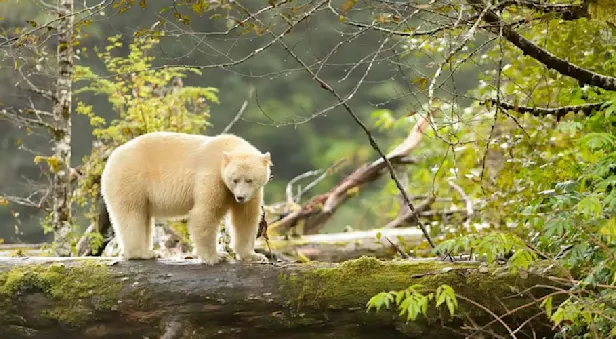
Know Before You Go
Beluga Whale Facts | Churchill Summer Wildlife Guide
Physical Characteristics
Beluga whales are toothed cetaceans, relatively small in size, weighing between 1,100 and 3,300 pounds. Males are bigger than females, reaching up to fifteen feet in length. Beluga whales have a bulky body, with a dense layer of blubber, along with a blunt head, small eyes, and a unique beak. They also have a protruding forehead, called a “melon”, which is thought to play a part in echolocation and communication. A beluga’s melon can change shape by spouting air through the sinuses. Melons will become flattened or rounded depending on their nourishment, and can be used to express emotions—an agitated beluga will elevate its melon into a raised position.
The beluga has a single blowhole and a forked tail and lacks a dorsal fin. Its mouth holds 38 conical teeth. Unlike most whales, the seven vertebrae in a beluga’s neck are not fused together, giving it the ability to turn its head in different directions. A beluga’s blubber, which is typically four to six inches thick depending on the water temperature and season, keeps it insulated in the frigid Arctic.
The name “beluga” has etymological origins to the Russian word bieluii, which means “white”. Indeed, beluga whales are easily identified by their alabaster-white coloring, and are oftentimes referred to as “white whales”. However, calves are born gray, losing their pigmentation as they age. A beluga’s white skin is an adaptive trait that allows them to camouflage into the Arctic sea ice, and hide from killer whales and polar bears.
Habitat
Belugas inhabit the icy polar regions of the Arctic and the sub-Arctic coasts of Svalbard, Greenland, Europe, North America, and Asia. They generally swim in waters below 59ºF, though they will they will occasionally wander as far south as the Puget Sound or the New Jersey coast. Pods may make their winter sites in stretches of open water enclosed by ice, called polynyas, or along the coast of the expanded ice pack in the open ocean.
In July, the beluga will travel into northern rivers to feed on salmon making their way to spawn. The beluga journeys in pods ranging from ten to thousands of members, though these larger numbers are rarely seen today.
Feeding Habits
Belugas have a diverse diet. They prey upon many types of fish, including herring, flounder, and salmon, in addition to shrimp, mollusks, octopus, squid, snails, crab, and an array of bottom-dwelling organisms.
A beluga will consume around 50 pounds of food a day, constituting about two to three percent of their body weight. It is believed that belugas hunt for prey using echolocation. Their dives for food typically last three to five minutes.
Behavior
Beluga whales are very social creatures, gathering in pods numbering in the hundreds or thousands during migrations and periods of plentiful food. For the most part, however, they hunt and travel in groups of ten, under the guidance of a large, dominant male. A pod’s migration is largely determined by the distribution of prey and the amount of sea ice.
Belugas swim a distance of two to six miles per hour. When needed, they are able to speed along at fourteen miles per hour for about fifteen minutes or so. As the coastal ice melts in the spring, a number of belugas will migrate toward warmer estuaries. Surprisingly, belugas thrive near the shoreline: they can swim in water with depths barely above their body, and can usually survive being stranded on land until the next high tide.
The beluga whale has an astounding repertoire of sounds. They squeak, trill, moo, click and whistle. Many of these calls are audible to the human ear above and below the water. When whalers of old heard these songs from the hulls of their ships, they nicknamed belugas “sea canaries”.
The beluga can express a broad variety of emotions with sound, such as smiling, whistling, showing aggression with its bulbous melon, and friendlily blowing bubbles from its blowhole. Being extremely social animals, pods frequently communicate with one another. The beluga may possess the most advanced and diverse sonar system of all cetacean.
Predators
A beluga’s white skin is an adaptive trait that allows them to camouflage in with Arctic sea ice, disguising themselves from their primary predators, killer whales, and polar bears.
Reproduction
Belugas typically give birth once every two or three years, to a single calf. Their gestation period lasts approximately fourteen months. Calves are born April through September, and newborns weigh about 154 pounds. A newborn calf has less than an inch of blubber but rapidly gains weight as they nurse on their mother’s milk, which contains up to 40 percent fat content. Offspring are weaned at about 1.5 to 2 years old.
Calves are born gray, turning blue-gray or dark gray after a month. After a year or two, they become blue in color, then change to a mottled yellow for the rest of their adolescence, until reaching pure white at sexual maturity. Adults molt annually and tend to appear more yellow in color preceding this time.Header Credit: Alexander de Vries
See Whales on These Northern Adventures

Churchill’s Belugas, Polar Bears & Arctic Wildlife
Meet hundreds of friendly beluga whales up close via Zodiac and kayak, and look for caribou, polar bears, Arctic fox and more on this exhilarating summer adventure in the Canadian subarctic.


Great Bear Rainforest: In Search of Spirit Bears, Grizzlies & Whales
Discover British Columbia at its wildest, in search of the elusive white Spirit Bear in the remote valleys of western Canada's Coast Range. Offshore, scout for humpback whales and orcas in emerald fjords.






























